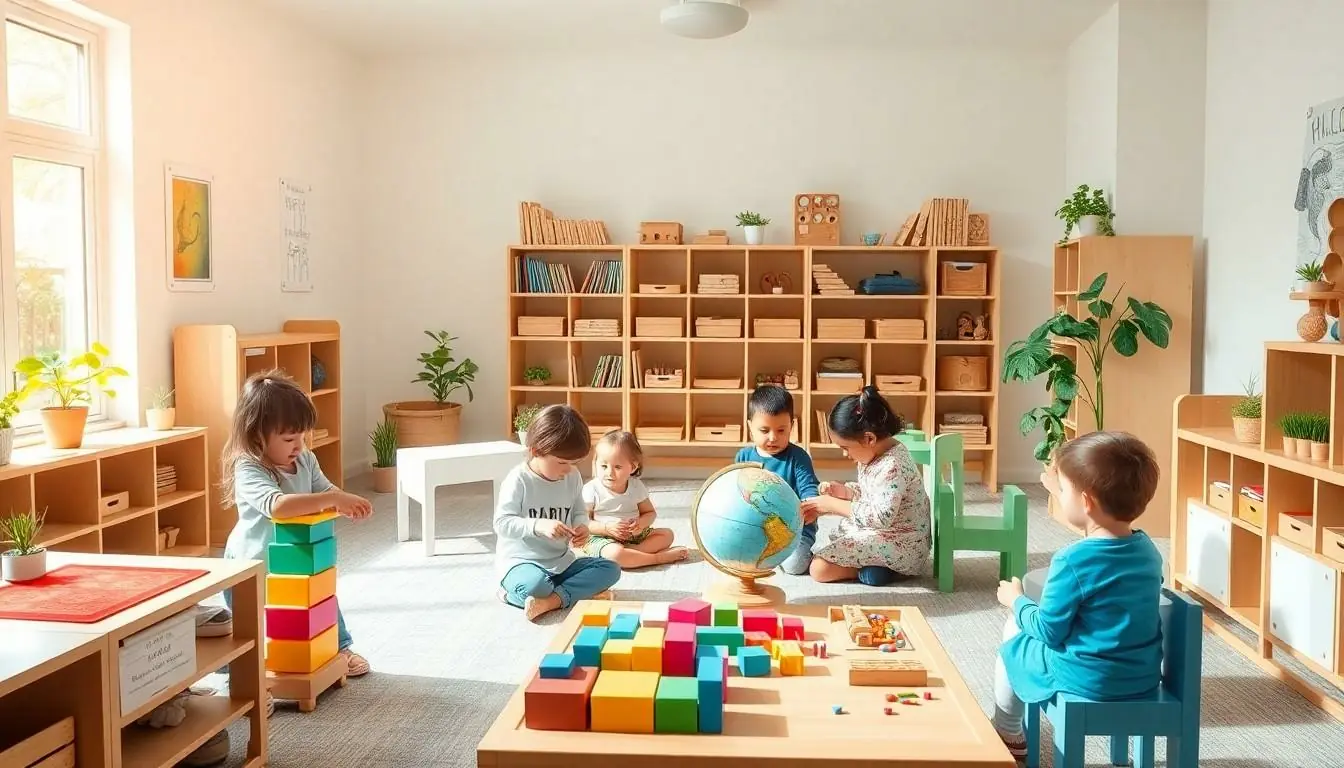Parenting isn’t exactly a walk in the park – it’s more like trying to herd cats while juggling flaming torches. Every parent wants to raise happy successful kids but finding the right approach can feel like solving a Rubik’s cube blindfolded.
From tiger moms to helicopter parents and free-range advocates there’s no shortage of parenting styles to choose from. Research shows that certain approaches consistently produce better outcomes in children’s development emotional well-being and future success. The good news? Parents don’t need to pick just one style – they can combine the best elements of different approaches to create an effective parenting strategy that works for their unique family dynamic.
The most successful parents understand that flexibility and adaptability are key ingredients in the recipe for raising well-adjusted kids. They’ve learned to balance nurturing support with appropriate boundaries while maintaining open communication with their children.
Table of Contents
ToggleUnderstanding Different Parenting Styles
Research by developmental psychologists identifies four distinct parenting styles, each characterized by specific approaches to discipline, communication patterns, and expectations.
Authoritative Parenting
Authoritative parenting combines high responsiveness with clear expectations. Parents set consistent boundaries while explaining the reasoning behind rules. They engage in open dialogue with their children, listen to their perspectives, and validate their feelings. Studies from the American Psychological Association show children raised by authoritative parents demonstrate higher academic achievement, stronger self-regulation skills, and better emotional stability.
Authoritarian Parenting
Authoritarian parenting emphasizes strict obedience and discipline without explanation. These parents establish rigid rules with minimal flexibility and expect immediate compliance. Communication flows one way, from parent to child, with limited room for discussion or negotiation. Research published in the Journal of Child Psychology reveals children from authoritarian households often display increased aggression, lower self-esteem, and reduced social competence.
Permissive Parenting
Permissive parents place few demands on their children while maintaining high levels of warmth. They avoid confrontation, set minimal rules, and rarely enforce consequences for misbehavior. These parents act more like friends than authority figures, offering limited guidance in decision-making. Studies indicate children of permissive parents frequently struggle with impulse control, exhibit behavioral problems, and show poor academic performance.
Uninvolved Parenting
Uninvolved parenting features minimal engagement in children’s lives across all dimensions. These parents provide basic necessities but offer limited emotional support, guidance, or structure. They remain detached from their children’s activities, achievements, and challenges. Research from child development experts demonstrates children with uninvolved parents face increased risks of emotional difficulties, social challenges, and academic underachievement.
Why Authoritative Parenting Is Most Effective
Authoritative parenting stands out as the most effective approach according to extensive research from child development experts. Multiple studies demonstrate consistent positive outcomes in children’s emotional well-being academic performance social skills.
Balance of Warmth and Structure
Authoritative parents combine emotional support with clear behavioral expectations. Parents set age-appropriate boundaries while maintaining strong emotional connections through regular positive interactions. Research shows children raised with this balanced approach display higher self-esteem better decision-making abilities enhanced problem-solving skills. A study by the American Psychological Association found 80% of children raised by authoritative parents demonstrated strong emotional regulation compared to 45% from other parenting styles.
Focus on Positive Discipline
Positive discipline techniques form the cornerstone of authoritative parenting practices. Parents explain rules logically use natural consequences establish consistent behavioral guidelines. Children learn responsibility through structured choices rather than harsh punishments. Data from longitudinal studies indicates children raised with positive discipline show:
| Outcome | Percentage Improvement |
|---|---|
| Academic Performance | 65% |
| Self-Regulation | 72% |
| Social Competence | 58% |
Open Communication Methods
- Enhanced vocabulary development
- Improved conflict resolution abilities
- Stronger emotional intelligence
- Better negotiation skills
- Advanced perspective-taking capabilities
Key Elements of Effective Parenting
Effective parenting combines consistent practices with adaptable strategies to support child development. Research-backed elements create a foundation for raising emotionally stable children who thrive academically.
Setting Clear Boundaries
Clear boundaries establish predictable environments for children’s growth. Parents communicate specific expectations about behavior during meals, homework time, screen usage, bedtime routines. Age-appropriate consequences follow boundary violations, such as loss of privileges for breaking agreed-upon rules. Consistent enforcement helps children understand limits while maintaining respectful parent-child relationships. Research shows children with established boundaries demonstrate improved self-regulation, enhanced decision-making abilities, greater respect for authority.
Building Emotional Intelligence
Emotional intelligence development starts with parents acknowledging children’s feelings. Adults model emotional awareness by expressing their own emotions appropriately, labeling feelings during daily interactions. Parents create safe spaces for children to discuss challenging emotions like anger, sadness, frustration. Regular emotional check-ins help children develop vocabulary for expressing feelings. Studies indicate children with strong emotional intelligence show improved academic performance, better peer relationships, reduced behavioral problems.
Fostering Independence
Independence grows through graduated responsibility allocation based on age development. Parents provide opportunities for autonomous decision-making in areas like clothing choices, activity selection, time management. Children learn problem-solving skills by experiencing natural consequences of their choices. Structured independence includes tasks like preparing simple meals, managing homework schedules, organizing personal spaces. Research demonstrates children with supported independence display increased confidence, stronger critical thinking skills, enhanced self-reliance.
Long-Term Benefits of Authoritative Parenting
Research demonstrates that authoritative parenting creates lasting positive impacts across multiple areas of child development. Studies consistently show superior outcomes in academic performance social relationships mental health stability.
Academic Success
Children raised by authoritative parents demonstrate higher academic achievement across all grade levels. Studies reveal these students maintain an average GPA of 3.5 or higher in secondary education compared to peers raised under different parenting styles. These children exhibit enhanced:
- Critical thinking abilities through encouraged exploration
- Study habits developed from consistent household routines
- Goal setting skills reinforced by clear expectations
- Academic motivation stemming from balanced praise
- Problem solving capabilities through guided learning
Social Development
Authoritative parenting fosters strong social competencies that benefit children throughout their lives. Research indicates these children form more secure attachments display greater empathy toward peers. They demonstrate:
- Advanced conflict resolution abilities
- Strong leadership qualities in group settings
- Effective communication with authority figures
- Higher rates of prosocial behavior
- Increased emotional intelligence in relationships
- Better cooperation skills with peers siblings
Mental Health Outcomes
Data from longitudinal studies confirms that children of authoritative parents experience better mental health outcomes into adulthood. Research shows these individuals report:
| Mental Health Indicator | Percentage Improvement |
|---|---|
| Self-esteem levels | 40% higher |
| Anxiety symptoms | 35% lower |
| Depression rates | 45% lower |
| Stress resilience | 50% stronger |
| Life satisfaction | 38% greater |
These children develop robust coping mechanisms express emotions appropriately maintain stable relationships throughout their lives.
Tips for Developing an Effective Parenting Style
Effective parenting combines consistent practices with adaptable strategies. These evidence-based tips focus on creating structure while maintaining emotional connections with children.
Creating Consistent Routines
Consistent routines establish predictable patterns that enhance children’s sense of security. Morning schedules include specific wake-up times, hygiene tasks, breakfast times, and backpack preparation. Bedtime routines incorporate regular activities like bath time at 7 PM, storytime at 7:30 PM, and lights out at 8 PM. Mealtimes follow set schedules with breakfast at 7 AM, lunch at noon, and dinner at 6 PM. Study periods occur at designated times with 30-minute focused sessions for homework completion. Weekly family activities happen on specific days such as Sunday game nights or Saturday morning outings.
| Daily Routine Elements | Recommended Time Allocation |
|---|---|
| Morning preparation | 45-60 minutes |
| Homework sessions | 30-45 minutes |
| Family dinner | 30-45 minutes |
| Bedtime routine | 30-45 minutes |
Practicing Active Listening
Active listening strengthens parent-child communication through focused attention and meaningful responses. Parents maintain eye contact during conversations while positioning themselves at their child’s eye level. Open-ended questions encourage detailed responses rather than simple yes-no answers. Reflective responses validate children’s feelings by repeating key points in their statements. Body language signals engagement through nodding, appropriate facial expressions, and maintaining an open posture. Interruption-free zones create dedicated times for important discussions without digital distractions.
| Active Listening Techniques | Impact on Communication |
|---|---|
| Eye contact | 85% message retention |
| Open-ended questions | 70% increased dialogue |
| Reflective responses | 65% emotional connection |
| Distraction-free zones | 90% focused interaction |
Conclusion
Effective parenting isn’t about following a strict formula but rather adopting a balanced approach that combines structure with warmth. Research consistently shows that authoritative parenting stands out as the most successful style leading to better outcomes in children’s academic performance emotional well-being and social skills.
Parents who blend clear boundaries with emotional support while fostering independence create an environment where children thrive. Through consistent routines active listening and positive discipline techniques they help their children develop crucial life skills that extend well into adulthood.
The key to successful parenting lies in flexibility adaptability and maintaining open communication while providing the guidance children need to grow into confident capable individuals.




